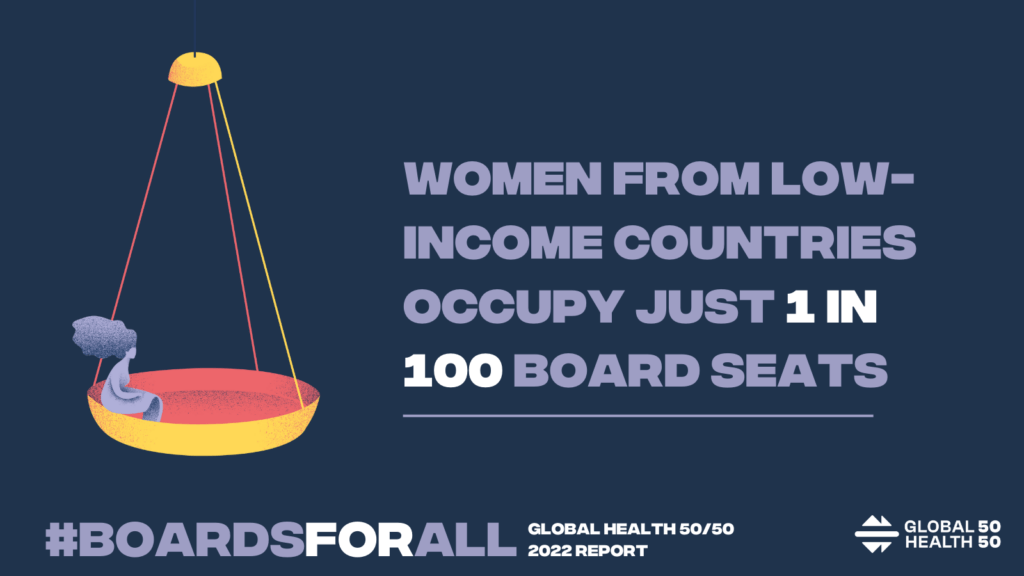
Women’s History Month ended on a rather depressing note, with GH5050’s hard-hitting 2022 report, Boards for All?. Through “A review of power, policy and people on the boards of organizations active in global health”, the report revealed that men from high income countries (HICs) continue to dominate and control the positions of power and decision making in global health, making a mockery of the ‘global’ in global health in the process.
Let’s start with some of the report’s killer stats perhaps. Just 17 (i.e.1%) of the 2033 global health governing board seats reviewed across 147 leading global health organizations, are occupied by women from low-income countries (LICs). On the other hand, 74% of total global health board seats are held by nationals of high-income countries (HICs), with 51% (!) even held by nationals of the two most dominant countries, the United States and the UK. It is not really global health we are talking about, apparently, based on these stats one would be forgiven to think that this work is about ‘health in the North’!
Meanwhile, only 25% of board seats are occupied by nationals of low-and-middle income countries (LMICs), when these countries are home to ~84% of the world’s population. Across the sector, women hold 40% of the total number of board seats (820/2033 seats), which is not too bad, I hear you say. But while women from LMICs make up 42% of the global population, they hold only 9% of board seats.
As a woman living in an LMIC myself (India) and involved in the Women in Global Health India chapter, I am appalled at these stats though I can’t say I’m surprised. The 2019 WHO landmark report Delivered by women, led by men already highlighted that women constitute more than 70% of the global health and social care workforce but hold only 25% of the leadership positions. With many compelling narratives questioning the status quo including a recent article by Lazenya Weekes-Richemond on why she left her career in global health, young people giving an F grade to how the world’s leaders (including the current crop of global health leaders) are tackling the multiple crises, and now this damning GH5050 report, all of these seem testaments to how broken, deeply patriarchal and colonial our global health system continues to be. Transformative change in so many ways is long overdue.
Indeed, how on earth will we achieve the goals of universal health coverage and health equity when the boards of leading global health organizations do not reflect the diversity of the people they intend to serve?
Benchmarking
One way in which GH5050 has been trying to make progress in this respect, is through tracking organisations’ commitment to gender equality over the years. In this benchmarking exercise, nearly 200 organizations have been tracked over the past five years. GH5050 found that 58% (80/138) organizations never had a woman CEO and 51% (70/138) organizations have not had a woman board chair in the last five years. The GH5050 Gender and Health Index (GHI) reveals that almost one-third of these organizations (32) have made little to no progress on gender equality and diversity. For the first time in global health history, these organizations have been publicly named (and shamed), as a step towards bringing transparency and accountability in global health. There are some “interesting names” among these “gender laggards”, I have to say.
On a more positive note, the report shows that nearly one-fifth of the organizations reviewed (39) have continuously performed well on the GHI, with transparent policies and measures in place to advance gender equality and gender-responsive programmatic approaches. Another ~27% of the organizations (55) have displayed increasing commitment to set and strengthen gender-responsive policies. These organizations could serve as great examples and even “role models” for the laggards to pick up pace, and recommit to democratizing and diversifying their boards and policies. Similarly, we see more women being represented than ever before, increasing from 20% of board chairs in 2018 to now 35% in 2022. Among the newly appointed board chairs, there’s an increase from 34% in 2020-21 to 43% in 2021-22.
While these improvements are encouraging, the report shows we are still far from achieving gender parity, however. Progress is even more slow when it comes to ensuring other measures of diversity among board chairs, think of regional diversity, race and ethnic diversity, inclusion of young people, and of people with disabilities or members of the LGBTQ+ community. Inclusion and representation from the communities we intend to serve would ensure that the decisions are rooted in the needs and community contexts of these people and not in the lobbying interests of others.
Boardrooms represent the locus of power and control over key strategic decisions and thus reflect whose voices would be heard, whose interests and needs would be served in those decisions. In light of growing evidence from across the world on countries with women leaders who have had better pandemic responses (see here and here for example) – even if ‘correlation doesn’t mean causation’ – the findings on lack of progress on democratising and diversifying global health governance are gruesome and alarming. We have failed as a global health community!
It’s not just global health governance and boardrooms, of course. Do have a look at the blatant lack of women in the current ‘peace negotiations’ between Russia and Ukraine for example… But global health should set an example. It’s more than time to demand transparency and accountability from global health organizations to really move from the rhetoric of gender equality and representation to real action on those lines, standing up to their commitments and publicly disclosing gender parity and diversity polices, for their governing boards, workplaces and programmatic approaches.
As the authors of the report say, it’s time to claim the Boardrooms. It’s time to end the mockery and go for democratic and inclusive global health governance in its true sense.
The Stark Truth narrated in the article. Kudos to the brave author